The Kenyan government plans to tighten regulation of social media platforms to curb what it terms as “misuse” of social media in the country. In a directive issued by the Ministry of Interior and National Administration on their X account, social media platforms are now required to set up offices in the country to ensure responsibility and accountability, citing the rise of mis and disinformation, hate speech, and online safety concerns. Some political leaders support this move, stating that social media platforms are being used to spread disinformation, facilitate cyberbullying and disseminate other harmful content. These calls for regulation of social media platforms also coincides with a petition calling for the banning TikTok for promoting sexually explicit content and threatening Kenya’s cultural and religious values.
Undoubtedly, social media platforms have an obligation to moderate content hosted on their platforms. They have a responsibility to respect users’ freedom of expression, as outlined in the UN Guiding Principles on Business and Human Rights. Furthermore, UNESCO’s Guidelines for the governance of digital platforms offers guidance and a framework on how platforms should conduct human rights due diligence and adhere to international human rights standards in content moderation. These guidelines are critical given that content moderation actions, such as post take down, shadow banning, account suspensions, and content labelling, can limit freedom of expression.
Content moderation is a complex process involving context dependent factors, which ideally should be done by trained individuals due to its impact on free speech. In practice, platforms employ a mix of algorithmic decision systems and human content moderators. Sometimes legal content is removed, and governments are increasingly requesting social media companies to take down content. Social media platforms must be transparent in reporting on the nature of these requests and their handling, recognizing that such requests can sometimes arise from political pressure that are contrary to international human rights standards on limitation of freedom of expression.
The call for responsible social media use comes at a time when social media users who criticize the government have been abducted or even found murdered. On 24th December 2024, Cartoonist Kibet Bull was abducted by individuals suspected to be security operatives. It is speculated that his abduction was in relation to a series of silhouette images of President William Ruto that were shared on X and other social media platforms. Kibet’s abduction comes hot in the heels of a wave of abductions of government critics since the June 2024 anti-finance bill protests.
But the increased government’s intolerance to criticism is not just at the national levels of governments but extends to county governments as well. For instance, on 6th December 2023, the body of a popular Meru political blogger Benard Muthiani popularly known as Sniper was found at a River with marks implying that he was strangulated. On 7th April 2024, the body of a popular Kisii based political blogger was found dangling with a rope around his neck. Both these bloggers paid a heavy price for criticizing local politicians online.
Conclusion
While the government is keen on removal of harmful content online, responsible social media use can be encouraged through;
- National digital literacy media training to fill in the skills gaps on identifying disinformation and manipulated content and information verification.
- Encouraging a media diversity and access to information to stem disinformation campaigns since disinformation thrives where there are no alternative sources of information for verification.
- Addressing regulatory guidelines on platform accountability in Kenya by putting in place guidelines to ensure tech companies respect human rights in the entire cycle of their operations such as product design, terms of use, content moderation and complaints handling mechanisms.
- Developing a robust competition framework for digital markets to discourage monopolization and in turn give consumers more choices and access to better services.
Authored by Angela Minayo, Program Officer, Digital Rights at ARTICLE 19 Eastern Africa
The views expressed in this blog are author’s own and not members of FECoMo coalition.
 Afrikaans
Afrikaans Shqip
Shqip አማርኛ
አማርኛ العربية
العربية Հայերեն
Հայերեն Azərbaycan dili
Azərbaycan dili Euskara
Euskara Беларуская мова
Беларуская мова বাংলা
বাংলা Bosanski
Bosanski Български
Български Català
Català Cebuano
Cebuano Chichewa
Chichewa 简体中文
简体中文 繁體中文
繁體中文 Corsu
Corsu Hrvatski
Hrvatski Čeština
Čeština Dansk
Dansk Nederlands
Nederlands English
English Esperanto
Esperanto Eesti
Eesti Filipino
Filipino Suomi
Suomi Français
Français Frysk
Frysk Galego
Galego ქართული
ქართული Deutsch
Deutsch Ελληνικά
Ελληνικά ગુજરાતી
ગુજરાતી Kreyol ayisyen
Kreyol ayisyen Harshen Hausa
Harshen Hausa Ōlelo Hawaiʻi
Ōlelo Hawaiʻi עִבְרִית
עִבְרִית हिन्दी
हिन्दी Hmong
Hmong Magyar
Magyar Íslenska
Íslenska Igbo
Igbo Bahasa Indonesia
Bahasa Indonesia Gaeilge
Gaeilge Italiano
Italiano 日本語
日本語 Basa Jawa
Basa Jawa ಕನ್ನಡ
ಕನ್ನಡ Қазақ тілі
Қазақ тілі ភាសាខ្មែរ
ភាសាខ្មែរ 한국어
한국어 كوردی
كوردی Кыргызча
Кыргызча ພາສາລາວ
ພາສາລາວ Latin
Latin Latviešu valoda
Latviešu valoda Lietuvių kalba
Lietuvių kalba Lëtzebuergesch
Lëtzebuergesch Македонски јазик
Македонски јазик Malagasy
Malagasy Bahasa Melayu
Bahasa Melayu മലയാളം
മലയാളം Maltese
Maltese Te Reo Māori
Te Reo Māori मराठी
मराठी Монгол
Монгол ဗမာစာ
ဗမာစာ नेपाली
नेपाली Norsk bokmål
Norsk bokmål پښتو
پښتو فارسی
فارسی Polski
Polski Português
Português ਪੰਜਾਬੀ
ਪੰਜਾਬੀ Română
Română Русский
Русский Samoan
Samoan Gàidhlig
Gàidhlig Српски језик
Српски језик Sesotho
Sesotho Shona
Shona سنڌي
سنڌي සිංහල
සිංහල Slovenčina
Slovenčina Slovenščina
Slovenščina Afsoomaali
Afsoomaali Español
Español Basa Sunda
Basa Sunda Kiswahili
Kiswahili Svenska
Svenska Тоҷикӣ
Тоҷикӣ தமிழ்
தமிழ் తెలుగు
తెలుగు ไทย
ไทย Türkçe
Türkçe Українська
Українська اردو
اردو O‘zbekcha
O‘zbekcha Tiếng Việt
Tiếng Việt Cymraeg
Cymraeg isiXhosa
isiXhosa יידיש
יידיש Yorùbá
Yorùbá Zulu
Zulu


